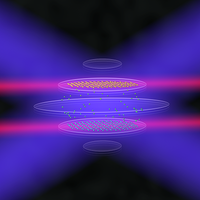用于量子信息处理的双层离子捕获晶体
IF 11.6
1区 物理与天体物理
Q1 PHYSICS, MULTIDISCIPLINARY
引用次数: 0
摘要
陷阱离子系统是量子信息处理的主要平台,但目前仅限于一维和二维阵列,这对其可扩展性和应用范围都造成了限制。在这里,我们提出了一条克服这一限制的途径,证明潘宁陷阱可用于实现非常干净的双层晶体,其中数百个离子自组织成两个定义明确的层。这些双层晶体的形成得益于加入了一种非谐波陷阱势能,而这种势能在现有技术条件下是很容易实现的。我们研究了这一系统的法向模式,并发现了与单面晶体的模式相比存在的显著差异。双层几何结构和法向模式的独特性质为量子传感和量子模拟等领域带来了新的机遇,而这些在单面晶体中是无法直接实现的。此外,我们还说明,有可能将本文提出的想法扩展到实现两层以上的多层晶体。我们的工作通过有效利用所有三个空间维度提高了被困离子系统的维度,为利用多层三维被困离子晶体进行新一代量子信息处理实验奠定了基础。本文章由计算机程序翻译,如有差异,请以英文原文为准。

Bilayer Crystals of Trapped Ions for Quantum Information Processing
Trapped-ion systems are a leading platform for quantum information processing, but they are currently limited to 1D and 2D arrays, which imposes restrictions on both their scalability and their range of applications. Here, we propose a path to overcome this limitation by demonstrating that Penning traps can be used to realize remarkably clean bilayer crystals, wherein hundreds of ions self-organize into two well-defined layers. These bilayer crystals are made possible by the inclusion of an anharmonic trapping potential, which is readily implementable with current technology. We study the normal modes of this system and discover salient differences compared to the modes of single-plane crystals. The bilayer geometry and the unique properties of the normal modes open new opportunities—in particular, in quantum sensing and quantum simulation—that are not straightforward in single-plane crystals. Furthermore, we illustrate that it may be possible to extend the ideas presented here to realize multilayer crystals with more than two layers. Our work increases the dimensionality of trapped-ion systems by efficiently utilizing all three spatial dimensions, and it lays the foundation for a new generation of quantum information processing experiments with multilayer 3D crystals of trapped ions.
求助全文
通过发布文献求助,成功后即可免费获取论文全文。
去求助
来源期刊

Physical Review X
PHYSICS, MULTIDISCIPLINARY-
CiteScore
24.60
自引率
1.60%
发文量
197
审稿时长
3 months
期刊介绍:
Physical Review X (PRX) stands as an exclusively online, fully open-access journal, emphasizing innovation, quality, and enduring impact in the scientific content it disseminates. Devoted to showcasing a curated selection of papers from pure, applied, and interdisciplinary physics, PRX aims to feature work with the potential to shape current and future research while leaving a lasting and profound impact in their respective fields. Encompassing the entire spectrum of physics subject areas, PRX places a special focus on groundbreaking interdisciplinary research with broad-reaching influence.
 求助内容:
求助内容: 应助结果提醒方式:
应助结果提醒方式:


